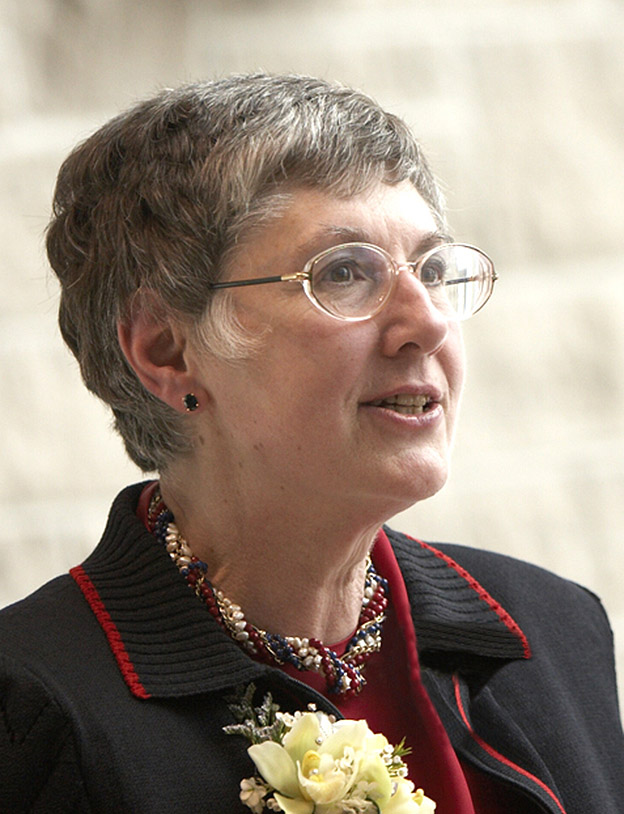‘That terrible day made the National War Memorial something more than stone and bronze’

Chancellor Suzanne Labarge spoke to McMaster staff, faculty and students at Tuesday's Remembrance Day service in Convocation Hall. In her remarks, Labarge talked about her grandmother, who was once a National Silver Cross Mother.
Chancellor Suzanne Labarge spoke to hundreds of members of the McMaster community Tuesday at the University’s Remembrance Day ceremony.
In her remarks, Labarge talked about the recent shooting at the National War Memorial in Ottawa and her own very personal connections to the Second World War.
Her remarks can be found below in full:
For 76 years, the National War Memorial has stood in the middle of Confederation Square in Ottawa. Originally, it commemorated the inspiring response of Canadians to what was then called the Great War, but in the years since, the memorial’s purpose has expanded to include our nation’s contributions to the Second World War and the war in Korea. The Prime Minister has also announced that the memorial will soon display the dates of our nation’s mission in Afghanistan.
The memorial was designed by Vernon March to honour the sacrifice of Canadians, yet not glorify war.
His Majesty King George VI unveiled the memorial on May 21, 1939 and in a speech witnessed by a crowd of more than 100,000, he proclaimed that “the memorial speaks to her world of Canada’s heart.”
Through all of the events and Remembrance Days that have passed since that speech, the National War Memorial was likely never more in the minds of the nation than it was on that day of the regal unveiling … at least not until three weeks ago.
When Corporal Nathan Cirillo of Hamilton was shot and killed while serving as the ceremonial guard, it put the National War Memorial tragically on the minds of all Canadians and, in fact, in the minds of friends and allies around the world.
Particularly for people in Ottawa and for people right here in Corporal Cirillo’s hometown, it made the National War Memorial something more than stone and bronze. That terrible day made the memorial far more personal. It brought the cost of service into the homes of a nation that, for certain periods in our history, has been far too well acquainted with that experience.
On Remembrance Day, I try never to lose sight of that fact. I try to remember, as we honour our fallen men and women in uniform, that for each of those Canadians, there were others at home making sacrifices of their own, feeling the cost of war right in their own homes.
There is another national war memorial of a kind in Canada, one that is very close to my heart. Its official name is the Canadian Memorial Cross, sometimes known as the Silver Cross, and perhaps better known by the title of the woman who annually represents her peers at our national Remembrance Day ceremony. She is the National Silver Cross Mother.
The Silver Cross began with an idea from Canadian novelist and essayist William Alexander Fraser in 1916. His letter to the Toronto Star advocating for an honour – specifically a silver cross – for mothers who had lost sons to the fighting in Europe inspired numerous and powerful supporters, including Prime Minister Robert Borden.
The Government of Canada created the honour in 1919. It became, of course, the medal no one wanted, but it is also an honour that helps keep memories of lost children alive, that helps connect the sacrifice of those in military service to our lives here at home.
Every year, one Silver Cross Mother serves as the National Silver Cross Mother and on November 11th, she follows the Governor General to the National War Memorial and lays a wreath almost in the final footsteps of Nathan Cirillo.
Gisele Michaud of Edmundston, New Brunswick has a wreath in her hands at this very moment. Her youngest son, Master Corporal Charles-Philippe Michaud was killed in Kandahar in 2009.
Remembrance Day may be a national observance, but it should also be immensely personal. It should be personal for all of us not just because we live today in the freedom created by the sacrifice of those we remember, but because for many of us, maybe all of us, there is a tangible personal connection at some point in our family trees.
Sixty-seven years ago today, the National Silver Cross Mother laid a wreath at the National War Memorial. She had lost two of her sons to the Second World War. One, a flight sergeant, was killed on September 30, 1942. The other, a pilot officer, died on March 12, 1943. In a cruel twist of fate, their mother and father learned of both boys’ deaths on the same day.
The National Silver Cross Mother in 1947 was listed in the Order of Service as Mrs. C. H. Labarge. I knew her better as Nana. I never knew my Uncle Leo or my Uncle Bernard.
Today, as we honour the fallen, let us remember the full and true cost of war.


